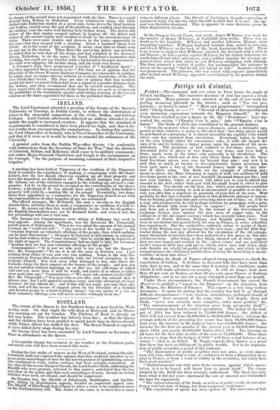IRELAND.
The Lord-Lieutenant attended a meeting of the Senate of the Queen's University on Tuesday, in Dublin Castle, to witness the distribution of prizes to the successful competitors of the Cork, Belfast, and Galway Colleges. Lord Carlisle afterwards delivered an address intended to sti- mulate the pupils to increased exertion. It appears that the standard of acquirements is considered to have been placed too high, and that it de- ters youths from encountering the examinations. In stating this opinion, the Lord Chancellor of Ireland, who is Vice-Chancellor of the University, said that if it were so it would be better to remodel the ordinances of the University. • A. general order from the Dublin War-office directs, " in conformity with instructions from the Secretary of State for War, ': that the districts of Limerick, Belfast, and Kilkenny, shall cease to be Military commands ; and orders Major-Generals Chatterton and Gough to the encampment on the Curragh, for the purpose of assuming command of their respective brigades.'
A meeting has been held at Tipperary of the creditors of the Tipperary Bank to consider the expediency of making a compromise with the share- holders, lest the law should otherwise swallow up all their property and leave the depositors no dividend at all. The official manager was present. Mr. Gibson, one of the solicitors engaged in the winding-up, advised a com- promise. Let 68. in the pound be accepted as the contribution of the share- holders • a dividend of 28. has already been paid ; probably John Sadleir's property will yield 2s.—making 108. in the pound. Eventually, two depo- sitors were appointed as a committee for the Tipperary branch to act with the representatives of other branches if any are nominated. The official manager, Mr. M‘Donell, has sent a circular to the English shareholders, advising them to make a compromise on condition of a full re- lease. He points out that this would probably be the best for all parties : the English shareholders may yet be declared liable, and even if not, the law proceedings will cost a vast sum.
The Income-tax Commissioners were sitting at Kilkenny last week to hear appeals. Among the appellants, was the Reverend Mr. Fitzgerald, parish-priest of Ballingarry. When he was asked the amount of his annual revenue, he " could not tell" - " any guess of his would be vague" • his " revenue depends on voluntary offerings of the people, than which nothing can be more fluctuating " ; the paper he had sent in did contain an estimate, but he had written down "some amount," that he might mit be deprived of the right of appeal. The Commissioners had no right fo take his revenues "because they are free and voluntary offerings of the people." Commissioner—" It is not we who seek to tax you, but the Queen." Rev. Mr. Fitzgerald—" To me it is all the same as between you. I get nothing from either of you, and owe you nothing. Yours is the only Go- vernment in Europe that gives nothing, with one trivial exception, to the Catholic Church. You took away what belonged to her, and threw the Catholic clergy for their support on the bounty of the people ; and now you are not satisfied without imposing on us this tax, the collection of which will cost you more than it will be worth, and render it as odious as tithes were some time ago." Commissioner—" We must rule against you for 1501." Rev. Mr. Fitzgerald—" You may rule as you like, and any amount that it pleases you ; but I will appeal to another court, and take advantage of every resource the law affords me : and if this will not avail, you may then dis- train, and sell the means of support given by the liberality of a faithful and devoted people to a hard-working clergy ; but one penny of a tax on their voluntary offerings you will never receive willingly from me."


























 Previous page
Previous page